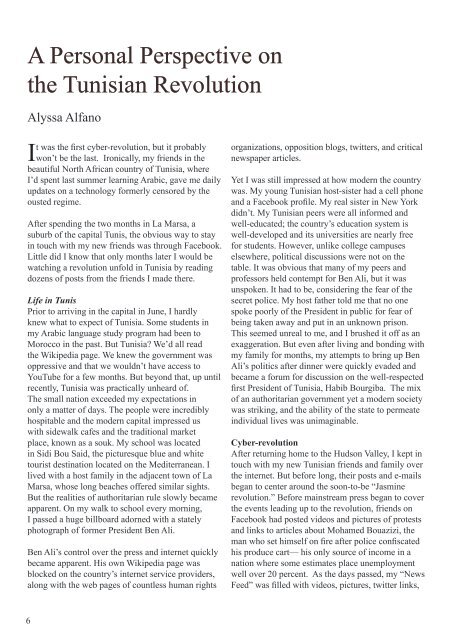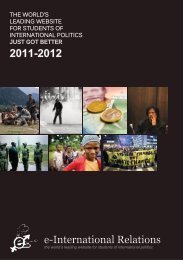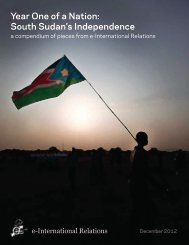The Arab Spring of Discontent - e-International Relations
The Arab Spring of Discontent - e-International Relations
The Arab Spring of Discontent - e-International Relations
You also want an ePaper? Increase the reach of your titles
YUMPU automatically turns print PDFs into web optimized ePapers that Google loves.
A Personal Perspective on<br />
the Tunisian Revolution<br />
Alyssa Alfano<br />
It was the first cyber-revolution, but it probably<br />
won’t be the last. Ironically, my friends in the<br />
beautiful North African country <strong>of</strong> Tunisia, where<br />
I’d spent last summer learning <strong>Arab</strong>ic, gave me daily<br />
updates on a technology formerly censored by the<br />
ousted regime.<br />
After spending the two months in La Marsa, a<br />
suburb <strong>of</strong> the capital Tunis, the obvious way to stay<br />
in touch with my new friends was through Facebook.<br />
Little did I know that only months later I would be<br />
watching a revolution unfold in Tunisia by reading<br />
dozens <strong>of</strong> posts from the friends I made there.<br />
Life in Tunis<br />
Prior to arriving in the capital in June, I hardly<br />
knew what to expect <strong>of</strong> Tunisia. Some students in<br />
my <strong>Arab</strong>ic language study program had been to<br />
Morocco in the past. But Tunisia? We’d all read<br />
the Wikipedia page. We knew the government was<br />
oppressive and that we wouldn’t have access to<br />
YouTube for a few months. But beyond that, up until<br />
recently, Tunisia was practically unheard <strong>of</strong>.<br />
<strong>The</strong> small nation exceeded my expectations in<br />
only a matter <strong>of</strong> days. <strong>The</strong> people were incredibly<br />
hospitable and the modern capital impressed us<br />
with sidewalk cafes and the traditional market<br />
place, known as a souk. My school was located<br />
in Sidi Bou Said, the picturesque blue and white<br />
tourist destination located on the Mediterranean. I<br />
lived with a host family in the adjacent town <strong>of</strong> La<br />
Marsa, whose long beaches <strong>of</strong>fered similar sights.<br />
But the realities <strong>of</strong> authoritarian rule slowly became<br />
apparent. On my walk to school every morning,<br />
I passed a huge billboard adorned with a stately<br />
photograph <strong>of</strong> former President Ben Ali.<br />
Ben Ali’s control over the press and internet quickly<br />
became apparent. His own Wikipedia page was<br />
blocked on the country’s internet service providers,<br />
along with the web pages <strong>of</strong> countless human rights<br />
organizations, opposition blogs, twitters, and critical<br />
newspaper articles.<br />
Yet I was still impressed at how modern the country<br />
was. My young Tunisian host-sister had a cell phone<br />
and a Facebook pr<strong>of</strong>ile. My real sister in New York<br />
didn’t. My Tunisian peers were all informed and<br />
well-educated; the country’s education system is<br />
well-developed and its universities are nearly free<br />
for students. However, unlike college campuses<br />
elsewhere, political discussions were not on the<br />
table. It was obvious that many <strong>of</strong> my peers and<br />
pr<strong>of</strong>essors held contempt for Ben Ali, but it was<br />
unspoken. It had to be, considering the fear <strong>of</strong> the<br />
secret police. My host father told me that no one<br />
spoke poorly <strong>of</strong> the President in public for fear <strong>of</strong><br />
being taken away and put in an unknown prison.<br />
This seemed unreal to me, and I brushed it <strong>of</strong>f as an<br />
exaggeration. But even after living and bonding with<br />
my family for months, my attempts to bring up Ben<br />
Ali’s politics after dinner were quickly evaded and<br />
became a forum for discussion on the well-respected<br />
first President <strong>of</strong> Tunisia, Habib Bourgiba. <strong>The</strong> mix<br />
<strong>of</strong> an authoritarian government yet a modern society<br />
was striking, and the ability <strong>of</strong> the state to permeate<br />
individual lives was unimaginable.<br />
Cyber-revolution<br />
After returning home to the Hudson Valley, I kept in<br />
touch with my new Tunisian friends and family over<br />
the internet. But before long, their posts and e-mails<br />
began to center around the soon-to-be “Jasmine<br />
revolution.” Before mainstream press began to cover<br />
the events leading up to the revolution, friends on<br />
Facebook had posted videos and pictures <strong>of</strong> protests<br />
and links to articles about Mohamed Bouazizi, the<br />
man who set himself on fire after police confiscated<br />
his produce cart— his only source <strong>of</strong> income in a<br />
nation where some estimates place unemployment<br />
well over 20 percent. As the days passed, my “News<br />
Feed” was filled with videos, pictures, twitter links,<br />
event invitations, and blogs all centered around the<br />
protests in each city. Grave updates filled my News<br />
Feed and inbox as police brutality, looting and the<br />
death toll rapidly increased.<br />
In solidarity with the Tunisians, I, along with my<br />
American friends who also spent time in the country,<br />
changed our Facebook pr<strong>of</strong>ile pictures to the<br />
Tunisian flag as the conflict escalated.<br />
As I noticed via Facebook and Twitter, the protests<br />
began over unemployment, but quickly escalated to<br />
include increased food prices, press censorship, and<br />
eventually to demands for the removal <strong>of</strong> President<br />
Ben Ali from <strong>of</strong>fice.<br />
Facebook groups and event pages allowed millions<br />
<strong>of</strong> youth to collaborate protest details, as well as a<br />
means <strong>of</strong> documenting both successes and horrors.<br />
Prior to the relevance <strong>of</strong> the internet, revolutions<br />
relied on pamphlets and word <strong>of</strong> mouth. It was the<br />
internet that facilitated the speed and precision <strong>of</strong><br />
this revolution.<br />
Although much <strong>of</strong> the revolution was hardly<br />
covered by mainstream media, Bouazizi’s desperate<br />
act finally gave citizens the courage, and a good<br />
reason, to speak up. On the day Ben Ali fled the<br />
country, a former teacher and friend posted: “We<br />
witnessed 01/14/2011! I am proud to be Tunisian!”<br />
After President Obama’s State <strong>of</strong> the Union Address<br />
earlier this week, numerous friends posted quotes<br />
from the speech about Tunisia, impressed with their<br />
ability to gain the attention <strong>of</strong> the U.S. This week,<br />
the interim Tunisian government issued an arrest<br />
warrant for their former president and relatives for<br />
stealing money from the nation.<br />
With the recent protests in Egypt and Yemen<br />
inspired by Tunisia, it seems clear that the Jasmine<br />
Revolution, fuelled by social-media, will not be the<br />
last <strong>of</strong> its kind. Many Tunisians have changed their<br />
pr<strong>of</strong>ile pictures to the Jasmine flower, a fragrant,<br />
pure white flower found throughout their country.<br />
While the violence has subsided, they recognize that<br />
the struggle for democracy has only begun, and are<br />
incessantly posting groups and statuses promoting<br />
the necessity <strong>of</strong> free and fair elections. <strong>The</strong>ir resolve<br />
is inspiring to all.<br />
While in the past it was more than common for<br />
leaders to rule their people through fear and threat,<br />
with increased education and accessibility to the<br />
internet, I would like to think that authoritarian<br />
leaders and dictators like Ben Ali will soon be<br />
known only in history. As Obama said in his State <strong>of</strong><br />
the Union Address, “<strong>The</strong> will <strong>of</strong> the people proved<br />
more powerful than the writ <strong>of</strong> a dictator…<strong>The</strong><br />
United States <strong>of</strong> America stands with the people<br />
<strong>of</strong> Tunisia.” While it is encouraging to have the<br />
President’s distant support, Tunisians and protesters<br />
around the world have an even better tool at their<br />
disposal: social media.<br />
6 7







